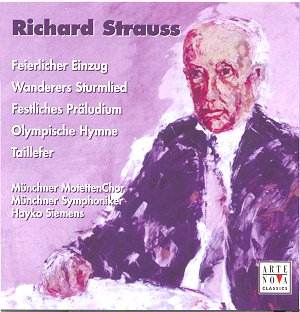Richard STRAUSS
Choral Works
Feierlicher Einzug; Wanderers Sturmlied Op 14; Festliches Präludium
Op 61; Olympic Hymn; Taillefer Op
52
 Elisabeth-Maria Wachutka
(sop); Gerhard Siegel (ten); Hans-Peter Scheidegger (bar); Münchner
MotettenChor; Münchner Symphoniker/ Hayko
Siemens
Elisabeth-Maria Wachutka
(sop); Gerhard Siegel (ten); Hans-Peter Scheidegger (bar); Münchner
MotettenChor; Münchner Symphoniker/ Hayko
Siemens
 ARTE NOVA Classics 74321
72107 2
[57.25]
ARTE NOVA Classics 74321
72107 2
[57.25]
Crotchet Bargain price

This is the third recording of Taillefer, Richard Strauss's most unlikely
vocal work, an enormous setting for soloists, chorus and orchestra, dating
from 1903, telling the story of the Battle of Hastings and the heroic deeds
of William the Conqueror's minstrel Taillefer. Owing to its overblown forces
and a battle scene that out-Heldenlebens Ein Heldenleben,
critical reception has not been as positive as I feel it deserves. Many
readers may, like me, have long secretly cherished the old Urania LP (UR
7042) with a magnificent war-time solo line-up from 1944 of Maria Cebotari,
Walter Ludwig and Hans Hotter now reissued on Preisser 90222. I guess today's
rehabilitation of the music dates, at least in the UK, from Sir John Pritchard's
BBC revival at the Royal Festival Hall in January 1989. I also seem to remember
an East German Radio recording by Dresden Forces conducted by Alexander Rahbari
which did the rounds late in 1989 and was broadcast by the BBC about then.
Much later came the Plasson performance, also with Dresden Forces issued
on EMI (7243 56572 2) which, with its coupling of Wanderer's Sturmlied
and the male voice choral work Die Tageszeiten constitutes the main
competition.
Historically Taillefer was killed in the battle; in Ludwig Uhland's ballad
he lives, a hero, finding he is as skilled in battle as in song. The words
are only given in German in the booklet - here's the last four lines in English
to give the flavour:
My gallant Taillefer, come pledge me a main!
Oft has thy singing cheered me, in pleasure and pain;
But that brave song today upon Hastings field
Will cheer me for ever, until to death I yield.
There is a similar recorded history for Wanderer's Sturmlied, a six-part
choral setting of extracts from a celebrated poem by Goethe very much in
the manner of Brahms's occasional choral works. Again we have a mono recording
from the 1950s - in this case Swoboda conducting Vienna forces on Westminster
WN 18075, and again Plasson's programme for EMI makes a convincing case for
the music in atmospheric digital sound. This new recording makes a strong
case for it, committed performers who seem to believe in the music, vocally
strong, and with all the benefits of a live concert.
The rest of the programme may sway it for you - keeping to the theme of the
colossal in Strauss - the curious fanfare-prelude Feierlicher Einzug,
the vapid Olympische Hymne of 1936, and the sprawling diatonic
Festliches Präludium from 1913, for organ and orchestra, the
latter really dependent on the grandest sounding Victorian instrument to
make its full impact. In 1973 I was involved in a tour including this work
conducted by Leslie Head, and its impact in the Victoria Hall, Hanley was
remarkable - relatively small hall and powerful organ. This brings that occasion
back, though it highlights one of the problems of this recording which has
clearly been made in a large hall, but only intermittently makes the most
of the big acoustic to add atmosphere to the proceedings. However, here -
and in much of Taillefer - we do begin to hear the hall, and the music
gains perspective when we do.
The Feierlicher Einzug has been recorded several times by various
brass groups - either just the fanfares or arrangements - here we have the
original with a large array of trumpets, and warmly supporting strings after
the opening fanfares. At 6¼ minutes it is only a chipping from the Strauss
workshop, but a completely typical one and worth the occasional airing. That
is more than can be said for the Olympische Hymne. Though, if it is
to be done, then it needs large forces such as these and a big space. Given
Strauss's objective of sweeping all sports enthusiasts along, as the booklet
note puts it, and with the eyes of the world and the Nazi regime on him,
it is curious to say the least that he produced so earth-bound a piece. Judging
by the rather tentative applause after this item even this local audience
seem to have thought it not a good idea. It is by a long way the weakest
piece in the programme, and it has such an unacceptable history from the
1936 Berlin Olympics on the whole one would prefer to forget it.
These performances were on the Richard Strauss day in Richard Strauss's home
town of Garmisch Partenkirchen in June 1999, recorded by Bavarian Radio.
Complete with applause to remind you these are public performances this is
a fascinating programme and a memento of a notable and unusual concert. And
with a remarkably quiet audience. If you only want the two main choral works,
and you are willing to pay full price, you will probably go for Plasson,
but these are very acceptable performances in a recording which in places
has real distinction in accommodating impossibly large forces; but when the
orchestra gets into closer focus can also sound a little tubby in places.
But at super-budget price, who is complaining?
Lewis Foreman

